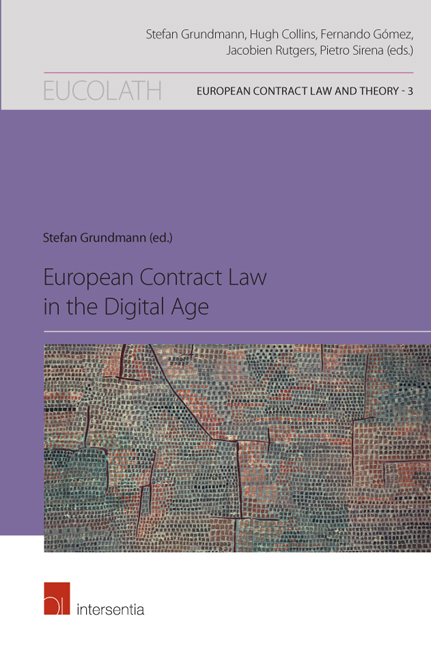Book contents
- Frontmatter
- Contents
- Table of Cases
- List of Authors
- PART I The Overall Architecture
- Part II Institutional Framework – Platforms, Regulation Issues, Global Surroundings
- Digital Contracts in Global Surroundings
- Regulating Online Platforms – The Case of Airbnb
- Crowdfunding in Europe
- Terms of Service are not Contracts – Beyond Contract Law in the Regulation of Online Platforms
- Part III Digital Formation of Contract – More Virtual and More Formalised
- Part IV Development and Implementation of Contract – More Digital, More Liquid
- Part V Digital Objects of Contract – CESL II and More
- Index
- European Contract Law and Theory Series
Crowdfunding in Europe
from Part II - Institutional Framework – Platforms, Regulation Issues, Global Surroundings
Published online by Cambridge University Press: 11 October 2018
- Frontmatter
- Contents
- Table of Cases
- List of Authors
- PART I The Overall Architecture
- Part II Institutional Framework – Platforms, Regulation Issues, Global Surroundings
- Digital Contracts in Global Surroundings
- Regulating Online Platforms – The Case of Airbnb
- Crowdfunding in Europe
- Terms of Service are not Contracts – Beyond Contract Law in the Regulation of Online Platforms
- Part III Digital Formation of Contract – More Virtual and More Formalised
- Part IV Development and Implementation of Contract – More Digital, More Liquid
- Part V Digital Objects of Contract – CESL II and More
- Index
- European Contract Law and Theory Series
Summary
ABSTRACT
This chapter studies the multifaceted nature of crowdfunding and focuses especially on the investment-based model, particularly the area of so-called ‘securities crowdfunding’ and its regulation in Europe. It starts by enunciating a general concept of crowdfunding and identifying its defining characteristics. The different business models falling under the general concept are then examined, in order to determine the different legal natures of the key underlying transactions in each of the models. The chapter then focuses on investment-based crowdfunding, describing the different structural options used in the practice to implement these transactions, and directs its attention to securities crowdfunding, the most relevant type in this category. Afteranalysing the complex realms of regulations, both at EU and a national level, that could potentially affect this specific type of crowdfunding, the chapter finally concludes by advocating regulatory intervention by the European Union in this field in order to simplify the current complex situation.
INTRODUCTION
Crowdfunding has become a very popular alternative source of funding in the last few years. Its success is partly due to the difficulties faced by small and medium-sized enterprises, start-ups and cultural projects to get finance in the context of the recent global economic crisis. The most common sources of finance such as bank loans, retained earnings, equity or venture capital, are often difficult to obtain for these types of initiatives, and other sources more frequently associated with small and innovative businesses, like ‘business angels’, money from family, friends and acquaintances, or public subsidies in the case of cultural projects, are oft en insufficient. This traditional financing problem has been exacerbated at the beginning of the twenty-first century by the global crisis, as a consequence of which all financing channels have been strongly restricted. Banking finance has diminished dramatically and has concentrated on wellestablished, low-risk firms, while venture capital and business angels have also reduced their activity in this context. Family, friends and acquaintances have been less able to help, since the crisis has impacted on their own budgets, and public subsidies have been sharply reduced.
- Type
- Chapter
- Information
- European Contract Law in the Digital Age , pp. 103 - 134Publisher: IntersentiaPrint publication year: 2018
- 3
- Cited by

